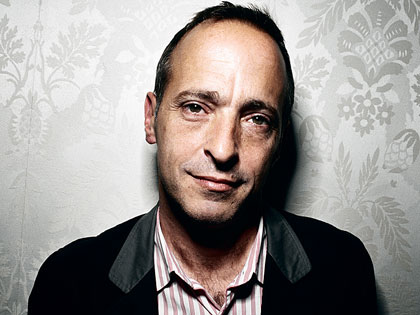I’m a reader of nonfiction. For some reason I have terrible trouble engaging in fiction. I’ll read two pages of a fiction book and then promptly turn it into this: (ha)
This is similar to my love for documentary film these days.
I’m not sure why I enjoy learning more about reality than fantasy. It could be the reason why I’m in a perpetual state of panic all of the time. I remember distinctly curling up into a ball on the corner of the couch after watching the documentary “Wal-Mart: The High Cost of Low Price” and crying for the future of the planet (this is actually true). If I read more fiction, I would maybe be a less anxious person. I’d believe in kid magicians and benevolent vampires instead of serial killers and tyrannical dictators.
When I read nonfiction, I do sometimes like reading light subject matters as well. Recently I finished Warren Zevon’s biography written by his ex-wife, Crystal, called, “I’ll Sleep When I’m Dead: The Dirty Life and Times of Warren Zevon“. Actually, I cried while reading that too. Nothing is more heart-breaking that a dude who was just turning his life around only to be told that he has terminal lung cancer. Zevon did not handling having cancer well. At one point, he locked himself in his apartment and tried to drink himself to death.
Ok, sometimes I actually read humor nonfiction and it’s really really hard to cry while digesting those.
I’m a fan of trying to add humor into my own writing (keyword- trying), because I figure no matter how shitty the subject matter I’m talking about is, at least the reader can get a laugh or two out of it.
Humor writing is hard and either you have a knack for it or you don’t. Truthfully, I think I fall in the “don’t” category, but I keep trying anyways!
I remember the first day I read David Sedaris and it was like the room instantly became brighter. I had no idea that one could write that way. We read a segment from “Santaland Diaries” in my creative writing course and I nearly fell over from laughing so hard (it was a classroom, I probably laughed internally). Sedaris’ literary comedic timing was brilliant and I promptly set out to gobble up as much of his writing as I could (pretty sure I didn’t set out immediately to find all of his work, it wasn’t until years later that I read “Me Talk Pretty One Day”).
David Sedaris has often been a writing role model for me. When I’m feeling stuck or uninspired, I’ll pick up one of his books on my shelf, read a little and let the powers of Sedaris’ words take over.
Since then, I try to pick up other humor writers from time to time. I read the highly praised first book of Sloane Crosley “I Was Told There’d Be Cake” right after it was released. Crosely was praised as the female counterpart to Sedaris, but I found myself not as amused when I first read her book. It’s been after years of revisiting the book that I’ve learned to appreciate the author’s humor. What I like about Crosley’s writing is that it seems real and less exaggerated than the aforementioned author which leads me to the point of my article.
Currently I’m reading Cheslea Handler’s “My Horizontal Life: A Collection of One-Night Stands” because it was three dollars at Half-Price Books and I dig a pretty lady who is self-deprecating. At first reading, I laughed hysterically. Handler is no Sedaris in terms of writing talent, but her years of being a stand-up comedian lent to hysterical one-liners and anecdotes. Halfway through reading her book, I began to lose steam. It became obvious to me that most of the book was fabricated. Though I wouldn’t be surprised if she did indeed sleep with a midget with a sombrero full of tequila and was dumped by a stripper named Thunder, the delicious humor that strung these stories together was not real, it was just forced comedy and nothing more.
This made me think back to my writing God, Sedaris, and begin questioning his stories as well (actually, I had been questioning his stories for a long time, particularly after I read an article, much like the one I’m about to share, a few years ago).
I came across an old The New Republic article that questions Sedaris authenticity through yesterday’s Gawker article, “There Is No Such Thing as a ‘Larger Truth’: This American Life’s Rich History of Embellishment”. In the article, the author, Alex Heard, goes as far as to fact check many of Sedaris’ stories to prove whether or not the writer’s work is highly fabricated. Though Heard was able to debunk some of Sedaris stories by interviewing family and old acquaintances/co-workers/principal, the real confirmation of Sedaris’ penchant for extreme exaggeration came from Sedaris himself. Sedaris told Heard that some of his stories were greatly amplified and that in fairness, he doesn’t see himself as journalist.
And that is the whole crux of the argument. Humor writing is not journalism, but why do I feel so cheated when I’m reading a humor memoir, only to realize that most of what happened didn’t happen the way we’re told it did? Why is it when I read David Sedaris and he brilliantly quotes a zinger by his crusty mother, I know it couldn’t possibly be verbatim and I feel so let down? It doesn’t stop me from reading and appreciating his work, but the light bulb that shown so brightly when I first read “Santaland Diaries” back in college, now is a wavering flicker.
And as a writer, what is that telling me? It tells me that I can have as much creative license to call my work real when in actuality, it’s not. Maybe that’s why people like Chuck Klosterman are smart when they put the disclaimer “85% of a True Story” at the end of their title.
I went back and wrote in red where I exaggerated in this story, just to spot where I exaggerate myself. Considering this wasn’t a humor piece, I didn’t exaggerate much.
Do you think extreme exaggeration in nonfiction humor writing is a cop out or do you think it’s part of the genre?
Do you find yourself embellishing a lot in your writing to get a desired effect?



7 Comments
Take consolation in the fact that even when you remember things yourself and you aren’t exaggerating it’s still probably largely BS. Our memories are not only imperfect and easily give into bias – but neuroscientists now believe that we reconstruct the events we’re remembering every time we access the memory. So in other words when you think back to your childhood home and remember the color of your swing set it’s possible your brain picked an entirely different color – for absolutely no reason. Furthermore, there might not have been a swing set at all. Why? Because our brains are screwy, and memory is subject entirely their whims. Looking at it like that the fabrications of memoirists isn’t much of a big deal.
I think in general women lack of sense of humor and that reflects in pop culture. Girls´s writing, music, filming, etc. is filled with love wounds, struggle and bad memories. I dont see the female counterpart of Woody Allen, or the Marx bros. Perhaps is not that women are not funny but they dont still master how to express humor.
Vanity Fair’s had a lot to say on that subject.
Both agreeing:
http://www.vanityfair.com/culture/features/2007/01/hitchens200701
And disagreeing:
http://www.vanityfair.com/culture/features/2008/04/funnygirls200804
But maybe you were joking. I can never tell. Jokes, like math and science, are, like, sooo hard.
Anyhoo, on the actual subject of this post,
I guess I always read Sedaris as sort of impossibly technicolor from the get-go and sort of assumed embellishment.
But we’ve all heard someone tell a story about something funny that happened to them that ends with, “I guess you had to be there…”
Humor writing is about communicating those weird, intangible qualities of an otherwise regular situation so that it feels like you were there and you get why it was funny.
That said, you’re exactly right that it’s a matter of labeling. I think This American Life’s retraction of the Mike Daisey piece was a pretty great discussion of the lines between fiction, non-fiction, memoir, and journalism. Although it would be interesting to hear *them* try to reconcile Sedaris’ liberties with their journalistic stance.
Omar, have you ever watched The New Girl? Created by Elizabeth Meriweather? That might change your mind.
But like Meghan below, I can’t tell if you’re joking or not…?
Wow, Omar! Love how you generalise an entire gender in your opening sentence, that is a skill – would love for you to teach it to me.
Hipstercrite — I too struggle with fiction, and often find myself hunting down documentary’s… I can completely relate.
My problem with books is that, I REALLY WANT to be in love with lots of fiction, I’m just not.
I guess it comes down to the fact that, with writers, I really need a voice I want to hear/read. I find it hard to find.
This isn’t my philosophy as a writer. This is how I feel about storytellers:
I don’t care if it’s true, false, or both.
I like writers who tell it to me straight, whatever it is. No kid gloves. No sugar. Debunking or proving someone else’s truth takes time, time better spent speaking your own truth, or fiction, or “whatever-the-fuck”.
I’ve definitely thought about this a lot. With humor writers, I guess I forgive them if they come out and warn you, “Some of this was made up” beforehand. If they don’t, I feel betrayed.